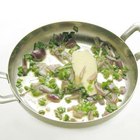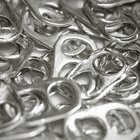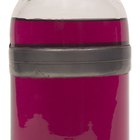
Creatas Images/Creatas/Getty Images
Aluminum serving dishes are lightweight, sturdy and relatively inexpensive -- but you may wonder if they are safe. Concern about health problems that might be caused by aluminum leaching into food from cookware, serving dishes and foil has been around for decades. Although some people avoid using aluminum for anything to do with cooking or serving due to perceived health risks, evidence shows these fears are likely unwarranted.
Tough to Avoid
As the third most common element on earth, aluminum occurs naturally in the soil. That means aluminum is also in the plants that grow there and in the tissues of the animals that eat those plants -- whether they are organic or not. Additionally, many everyday products contain aluminum, including deodorants, processed and pickled foods, antacids and buffered aspirin. You're eating small amounts of aluminum every day, no matter what type of cookware or serving dishes you choose.
The Concern
In the 1960s and 1970s, many people became concerned about a possible link between aluminum and Alzheimer’s disease when autopsies showed deposits of aluminum salts in the brains of people who had died of Alzheimer’s. Further studies failed to confirm the connection, though, showing that aluminum salts collect in any soft tissue of the body where there is cell loss. For example, aluminum salts also collect in the heart of a person with coronary disease.
The possible link has been extensively studied, and today, the Alzheimer’s Association and medical experts agree that everyday sources of aluminum do not play any role in causing Alzheimer’s disease.
Precautionary Measures
Even without a connection to Alzheimer’s disease, aluminum is still listed as a health-jeopardizing toxin by the U.S. Department of Health and Human Services if ingested in large amounts. Accordingly, some people may want to curtail the amount of aluminum in their systems as much as possible.
Aluminum can’t be entirely avoided, but some experts suggest eating fewer animals at the top of the food chain, because aluminum can be concentrated in their meat, and avoiding aerosol deodorants containing aluminum salts that can be inhaled. You don't need to avoid aluminum cookware or serving pieces.
Final Analysis
Changing the type of serving dishes you use isn’t likely to affect the amount of aluminum in the foods you cook. The amount of the metal that leaches to foods through serving dishes is negligible. If you want to err on the side of caution, using glass or ceramic serving dishes instead of aluminum may provide peace of mind.
Related Articles

Is Cooking With Galvanized Aluminum ...

Are Nickel Lined Pans Safe?

What Are the Dangers of Cooking With ...

Hazards of Baking a Potato in Foil

What Are the Dangers of Sauerkraut?

How to Cook With Stainless-Steel Frying ...

Copper Peptides Side Effects

How to Make Aluminum Jewelry Cleaner

Side Effects of Monosodium Glutamate

Recycling Aluminum Tabs Vs. Cans

A List of Foods That Contain Choline

Can You Use a Glass Pan to Cook a Roast?

Why Do Some People Refuse to Say I Love ...

Is All Chinese Food Fattening?

Heating Foods in Plastic & BPA

What Are the Dangers of Titanium in ...

How to Figure How Much Food for a ...

Alcohol Content of Cooking Sherry

Glass Pie Pan Baking Tips

Foods to Avoid to Prevent Gout
References
Writer Bio
Janet Burt has written professionally for more than 20 years, specializing in business, careers, healthcare and the arts. Her work has appeared in “Self,” “Focus,” and “The Philadelphia Inquirer,” among other places. Also a professional artist, Burt has a degree in English and German from Colgate University.
Photo Credits
Creatas Images/Creatas/Getty Images